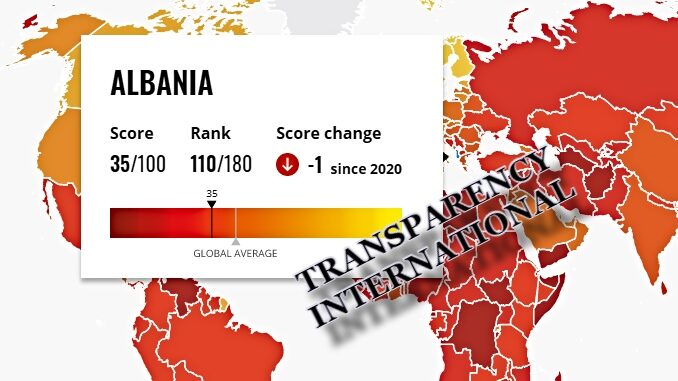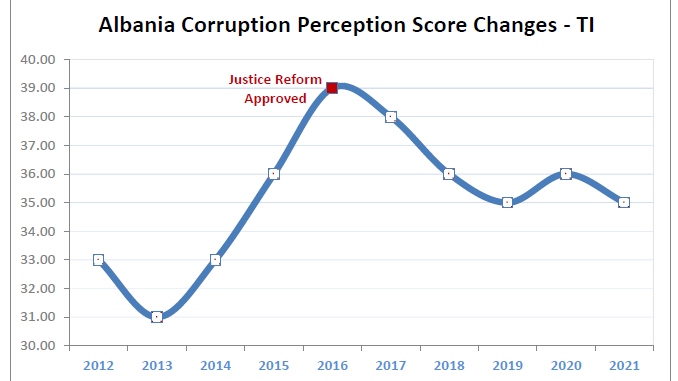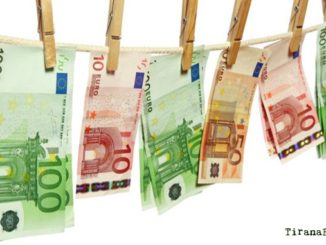
Tirana, Albania – | 26 Jan 2022 (Tirana Echo) – Albania continues to decline in its anti-corruption strategy according to Transparency International’s Corruption Perception Index for 2021.
Albania ranked 110th among 180 nations with a score of 35 out of 100, according to the latest report alongside Sri Lanka, Cote d’Ivoire, Ecuador, Moldova, Panama, Peru, Malawi and Mongolia.
The country ranked lower than its neighbors with Montenegro at 64th place, Serbia at 96th, Kosovo and North Macedonia at 87th and Croatia at 63rd place. Albania ranked alongside Bosnia and Herzegovina, at the bottom of regional scores and far from western European democracies.
Chart figures during the last decade, show Albania has lingered on around the same levels, with a peak in 2016, and later in constant decline. (see TI chart below)

Copyright @TiranaEcho
While the latest perception data are a disappointment for Edi Rama’s socialist ruling majority, the decline since 2016 from 83rd place to 110th, is a bigger blow to Albania’s controversial reform of its justice system, a major overhaul of its legal infrastructure with strong support from the United States and the European Union.
In 2016, the Albanian Parliament approved major changes to its constitution, accompanied by a series of core laws as part of a comprehensive reform of its justice system. This undertaking by Western partners paved the way for a vetting process of its judges and prosecutors while setting up and international monitoring operation (IMO), guaranteeing US and EU oversight over future justice appointments in the small Balkan country.
As a result, many judges and prosecutors have been fired as a result of the Vetting Process while the country has found it hard to fill in the vacancies created. A special anti-corruption prosecution office (SPAK) has been established and vacancies for its National Bureau of Investigation (BKH) have recently been filled up. However, critics point out that new institutions are under the government’s influence in who they pick to go after and the EU’s failure to act.
Lulzim Basha, the head of the main opposition Democratic Party of Albania (EPP-affiliated), has constantly accused the European Commission of being too lenient with the government in place “for the sake of stability”.
“Brussels has chosen to focus on the technical process of law harmonisation for the sake of stability to the cost of democracy […] this has been misused by autocratic leaders in the Balkans, who are now endangering stability because of corruption, collusion with the organised crime and state capture,” Basha told EURACTIV.com recently in a telephone interview.
While on paper the reform has been hailed as a model for other Balkan countries and that the country’s standards are getting closer to those in the EU, the perception of Albanian people has constantly declined since 2016, due to prevailing impunity and high levels of political corruption which rules the country on the ground.
Transparency International’s latest report confirms that perception, reconfirming its wider assessment that weak checks and balances threaten anti-corruption efforts, while noting that democratic hopes are dashed in the shadow of growing authoritarianism.
“In Albania (35), journalists suffer lawsuits and intimidation, including excessive control of information related to COVID-19 responses. Moreover concerns over police violence during demonstrations and breaches of freedom of assembly have been registered throughout the pandemic. The pandemic was also used as an excuse to reduce oversight and accountability for public procurement and foreign aid spending, allowing corruption to spread widely” – notes TI.
The report found that across South-East Europe and Central Asia, corruption continues to “undermine democratic rights and institutions by allowing corrupt leaders to use undemocratic practices to protect themselves from prosecution and increase their wealth”.
Albania hopes to join the European Union while its member states remain skeptical about its serious efforts to improve levels of governance and rule of law.
In 2014, the country was granted candidate status by the European Council and in 2016 the European Commission recommended the start of Accession Talks.
Despite a series of recommendations and draft negotiation frameworks presented by the Commission, the Council has yet to approve the holding of the first Inter-Governmental Conference of accession negotiations.
Years of dysfunctional justice system and the lack of proper political will to reform its highly corrupt administration is costing the poor Balkan country billions in foreign investments while its youthful labor force seeks to leave the country in pursuit of better alternatives in Western Europe.
Copyright @2022 TiranaEcho.com | All Rights Reserved

